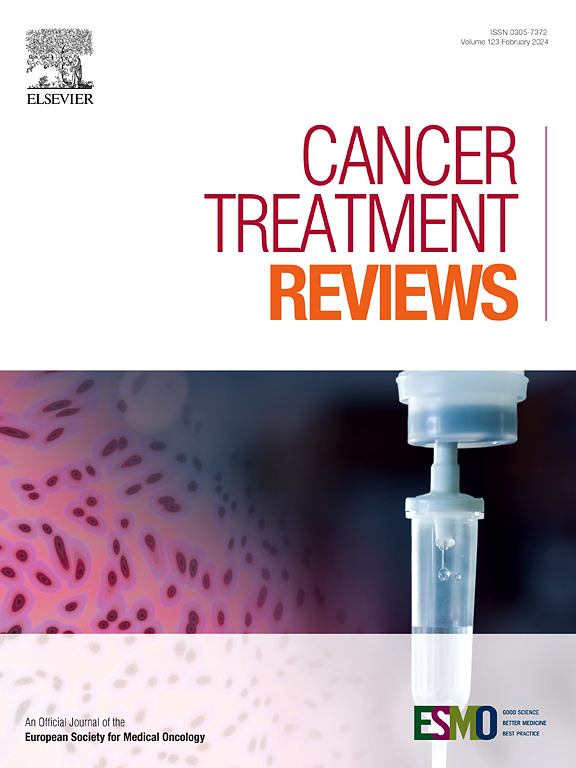PI3K/AKT/mTOR inhibitors for hormone receptor-positive advanced breast cancer
IF 9.6
1区 医学
Q1 ONCOLOGY
引用次数: 0
Abstract
Dysregulation of the phosphatidylinositol 3-kinase/protein kinase B/mammalian target of rapamycin (PI3K/AKT/mTOR) pathway plays a pivotal role in the development and progression of various cancers. In hormone receptor-positive (HR+)/human epidermal growth factor receptor 2-negative (HER2-) advanced breast cancer, aberrations in this pathway are increasingly recognized as key drivers of resistance to endocrine therapy and cyclin-dependent kinase 4/6 (CDK4/6) inhibitors, the first-line treatments for this disease subtype. Recognizing the urgent need for alternative therapeutic strategies, significant advancements have been made in developing PI3K/AKT/mTOR inhibitors for HR+ advanced/metastatic breast cancer. Among these inhibitors, capivasertib and alpelisib have received approval as targeted therapies for this indication. This review provides a comprehensive summary of the latest developments in PI3K/AKT/mTOR inhibitors for HR+ breast cancer. It also delves into different aspects, including sampling, testing method and timing, of PI3K/AKT/mTOR diagnostic testing. Additionally, the review discusses key considerations for integrating these inhibitors into clinical practice, such as timing and choice of PI3K/AKT/mTOR inhibitors, and management of treatment toxicities. By examining these different aspects, this review aims to provide valuable insights into optimizing the clinical utility of PI3K/AKT/mTOR inhibitors in HR+ advanced breast cancer.
PI3K/AKT/mTOR抑制剂治疗激素受体阳性晚期乳腺癌
磷脂酰肌醇3-激酶/蛋白激酶B/哺乳动物雷帕霉素靶蛋白(PI3K/AKT/mTOR)通路的失调在各种癌症的发生和发展中起关键作用。在激素受体阳性(HR+)/人表皮生长因子受体2阴性(HER2-)晚期乳腺癌中,该通路的畸变越来越被认为是对内分泌治疗和细胞周期蛋白依赖性激酶4/6 (CDK4/6)抑制剂(该疾病亚型的一线治疗药物)产生耐药性的关键驱动因素。认识到迫切需要替代治疗策略,在开发用于HR+晚期/转移性乳腺癌的PI3K/AKT/mTOR抑制剂方面取得了重大进展。在这些抑制剂中,capivasertib和alpelisib已被批准作为该适应症的靶向治疗。本文综述了PI3K/AKT/mTOR抑制剂治疗HR阳性乳腺癌的最新进展。并对PI3K/AKT/mTOR诊断检测的采样、检测方法和时间等方面进行了深入探讨。此外,本综述还讨论了将这些抑制剂整合到临床实践中的关键考虑因素,例如PI3K/AKT/mTOR抑制剂的时机和选择,以及治疗毒性的管理。通过研究这些不同的方面,本综述旨在为优化PI3K/AKT/mTOR抑制剂在HR+晚期乳腺癌中的临床应用提供有价值的见解。
本文章由计算机程序翻译,如有差异,请以英文原文为准。
求助全文
约1分钟内获得全文
求助全文
来源期刊

Cancer treatment reviews
医学-肿瘤学
CiteScore
21.40
自引率
0.80%
发文量
109
审稿时长
13 days
期刊介绍:
Cancer Treatment Reviews
Journal Overview:
International journal focused on developments in cancer treatment research
Publishes state-of-the-art, authoritative reviews to keep clinicians and researchers informed
Regular Sections in Each Issue:
Comments on Controversy
Tumor Reviews
Anti-tumor Treatments
New Drugs
Complications of Treatment
General and Supportive Care
Laboratory/Clinic Interface
Submission and Editorial System:
Online submission and editorial system for Cancer Treatment Reviews
 求助内容:
求助内容: 应助结果提醒方式:
应助结果提醒方式:


